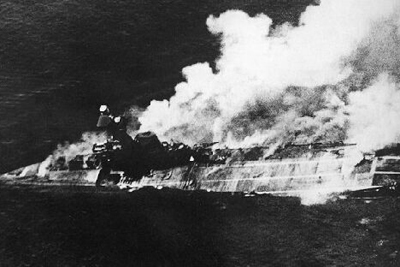
 |
|
H.M.S. Hermes - Expedition I & II - (www.DiveSriLanka.com)
Batticoloa
By Dharshana Jayawardena. Photo Credits: Felician Fernando & Brendon D' Souza
Depth: 53 Meters. (Technical Decompression Dive)
 The Hermes burns after taking 40 direct hits |
|||
The descend seems to be eternal. Ten meters. Twenty meters. In an ocean so ethereally blue, the visibility must be undoubtedly limitless. Yet the fish are in the hiding; for except for countless Yellow Back Fusiliers and Long Fin Bannerfish, the ocean feels vast and abandoned. This is unusual; for in other dives we have seen large schools of Great Barracuda, Trevally, Tuna, very large Potato Cods, Panther Torpedo Rays and Sea Snakes very often. But not today. The blazing sunlight streams down the clear blue waters in cascading bars and seems to converge into one single point. Our eyes scan keenly to the depths in anticipation. Nothing. We gently slip further down. The gauge registers about 30 meters and then suddenly out of no where a large shape looms beneath us. At first glance, one is forgiven for thinking that this is a large rock. But this is not. This is the H.M.S. Hermes. The worlds first purpose built Air Craft Carrier; built by Armstrong-Whitworths in January 1918; launched September 11, 1919; commissioned by the British Royal Navy 1923 and sunk by the Japanese in April 9th 1942. At a depth of 42 meters, amidst a gentle current, we let go of the anchor rope and unreel our way 60 years back into history. |
|||
 A large Potato Cod seen on a later dive |
 The Hermes generally hides large Groupers around its bulk. |
||
White. In the dim light at 42
meters that's the color that first strikes the mind. Everything seems so
beautifully white. The ship is covered with a lovely growth of Black Coral.
According to the 1982 Rex Morgan expedition, (The son of Charles Morgan,
the Royal Navy commissioned photographer who captured the historic last
moments of the H.M.S. Hermes demise. Rex Morgan is the author of the Hermes
Adventure, an electrifying narrative of the last moments of the ship
based on survivor accounts) the ship is lying on its deck with the keel
over and and also partly resting on its superstructure. Based on many dives
we have done here, we tend to agree. Yet on this dive, it is difficult to
say where exactly in the ship we are right now. In this light the visibility
is only a few meters ahead and encrustation distorts the features of this
massive ship. We continue to swim over the immense hulk. It is then that
we spot one of the Anti Air Craft Guns and its cache of unused shells. What
a fantastic sight! The water is very cold here and a strong current pushes
us back. We do not have much time. |
|||
 Base of one of the three 4 inch Anti Air Craft Guns |
 Top of the cannon |
||
 Anti Air Craft Gun Shells still remaining to this day. The strike marks of the Japanese bombing is still clearly visible. We have also seen immense anchors still in its hold. Many other guns in the lower decks are visible. These are sometimes accompanied with caches of unused shells. |
Hermes Vital Stats: The Hermes was under repairs at the Trincomalee port when she was scrambled south based on an advanced warning of an impending Japanese air raid. She was accompanied by the destroyer HMS Vampire, the corvette Hollyhock and two tankers. All were sunk. The Hermes started sinking just after 10 minutes of the first strike by Japanese Zero Dive Bombers. Many survived, and were picked up by the Hospital Ship H.M.S Vita. |
||
 Like a vast yellow mist, the ship is enveloped by clouds of Blue Striped Snappers. |
 And of course, here is the the endless ballet of the huge shoals of Trevally hunting with zeal. |
||
 Once we saw lots of Panther Torpedo Rays resting on the ship |
|
||
 Basslets frolicking among beautiful black coral. |
 In the murky depths, a vast fish ball in the forming. |
||
 The black of the Bannerfish contrasting against the white of the Black Coral is an unforgettable sight. |
 The whole ship gives an incredible white auroa; thanks to the vast swathes of Black Coral. |
||
 A diver with a safety reel. This was a relatively equipment intensive two tank decompression dive lasting about 90 minutes total dive time. |
We hover around the Anti Air Craft Gun savoring every precious minute. But also with a reverence as we are constantly reminded of the 307 souls who perished in this very ship. This, in front of us, is one of the largest undersea war graves in the world. It is now time to leave and start decompression sequence. With great reluctance we bestow a last yearning glance at the immense superstructure and start our slow ascend to the world of light. The Hermes is named after the mythological Grecian god of boundaries and of the travelers who cross them. To cross this boundary is a life time experience. But It is indeed a boundary to be crossed with great care. And, as it often holds true for some boundaries; to cross this boundary is never to return... For after diving the Hermes, you are irrevocably changed for ever. |
||
|
<Back to the Hermes home page (for details of other expeditions) Pictures & writing is the property of DiveSriLanka.com - view our copyright policy |
|||